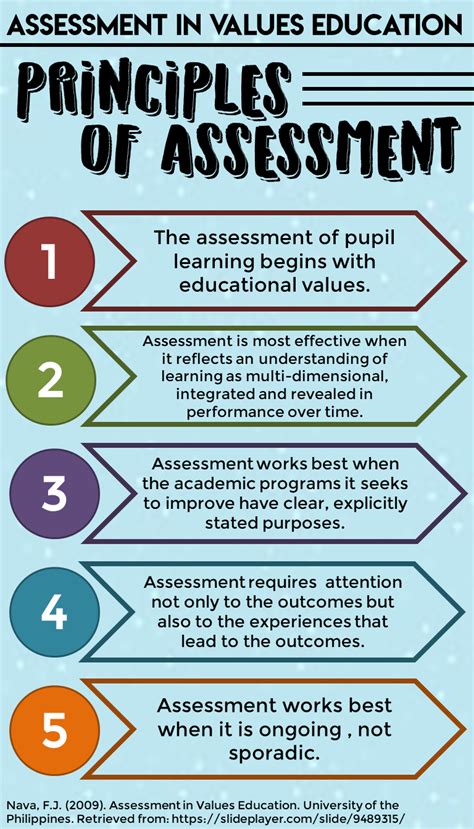The assessment process is a crucial aspect of counseling, as it enables counselors to understand their clients' needs, strengths, and challenges. Effective assessment helps counselors develop a comprehensive treatment plan, establish a strong therapeutic relationship, and monitor client progress. In this article, we will explore the 7 principles of assessment in counseling, providing a comprehensive guide for counselors to improve their assessment skills.
The Importance of Assessment in Counseling
Assessment is an ongoing process that begins with the initial contact between the counselor and client. It involves gathering information about the client's presenting issues, personal history, and current situation. Accurate assessment is essential in counseling, as it helps counselors to:
- Identify the client's strengths and challenges
- Develop a comprehensive treatment plan
- Establish a strong therapeutic relationship
- Monitor client progress and adjust the treatment plan as needed
Principle 1: A Comprehensive Assessment is a Collaborative Process
A comprehensive assessment is not a one-way process where the counselor simply gathers information from the client. Rather, it is a collaborative process that involves the active participation of both the counselor and client. The counselor should work with the client to identify their needs, strengths, and challenges, and involve them in the assessment process.

Principle 2: Assessment is an Ongoing Process
Assessment is not a one-time event, but rather an ongoing process that continues throughout the counseling relationship. As the client progresses through the treatment plan, the counselor should continue to assess their needs, strengths, and challenges. This ongoing assessment process helps the counselor to adjust the treatment plan as needed and ensure that the client is making progress towards their goals.
Principle 3: A Comprehensive Assessment Should be Culturally Sensitive
A comprehensive assessment should take into account the client's cultural background, values, and beliefs. The counselor should be aware of their own cultural biases and assumptions, and strive to create a safe and inclusive environment for the client. This includes using culturally sensitive assessment tools and techniques, and being aware of the client's cultural norms and values.

Principle 4: Assessment Should be Based on Multiple Sources of Information
A comprehensive assessment should be based on multiple sources of information, including:
- Clinical interviews with the client
- Standardized assessment tools, such as questionnaires and rating scales
- Observational data, such as behavioral observations
- Collateral information, such as reports from family members or healthcare providers
Using multiple sources of information helps to ensure that the assessment is accurate and comprehensive, and reduces the risk of bias or error.
Principle 5: Assessment Should be Focused on the Client's Strengths and Resilience
A comprehensive assessment should focus not only on the client's challenges and deficits, but also on their strengths and resilience. This includes identifying the client's coping skills, support systems, and personal strengths, and using these to inform the treatment plan.

Principle 6: Assessment Should be Based on Empirically Supported Methods
A comprehensive assessment should be based on empirically supported methods, including standardized assessment tools and techniques. This helps to ensure that the assessment is accurate and reliable, and reduces the risk of bias or error.
Principle 7: Assessment Should be Documented and Communicated Effectively
A comprehensive assessment should be documented and communicated effectively, both to the client and to other healthcare providers. This includes maintaining accurate and detailed records of the assessment process, and communicating the results of the assessment to the client in a clear and understandable way.







What is the purpose of assessment in counseling?
+The purpose of assessment in counseling is to gather information about the client's needs, strengths, and challenges, and to develop a comprehensive treatment plan.
What are some common assessment tools used in counseling?
+Some common assessment tools used in counseling include standardized questionnaires, rating scales, and behavioral observations.
How often should assessment be conducted in counseling?
+Assessment should be conducted on an ongoing basis throughout the counseling relationship, as the client's needs and circumstances may change over time.
We hope this article has provided a comprehensive guide to the 7 principles of assessment in counseling. By following these principles, counselors can ensure that their assessment process is accurate, comprehensive, and effective in meeting the needs of their clients. Remember to always prioritize the client's strengths and resilience, and to communicate the results of the assessment in a clear and understandable way.
